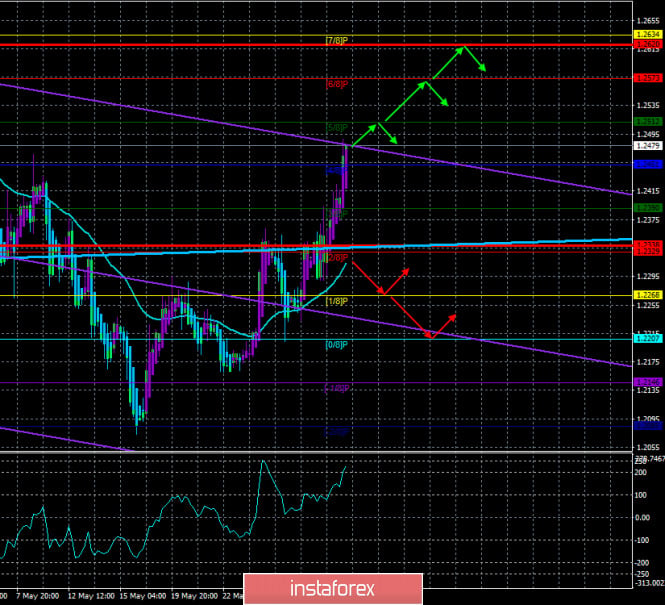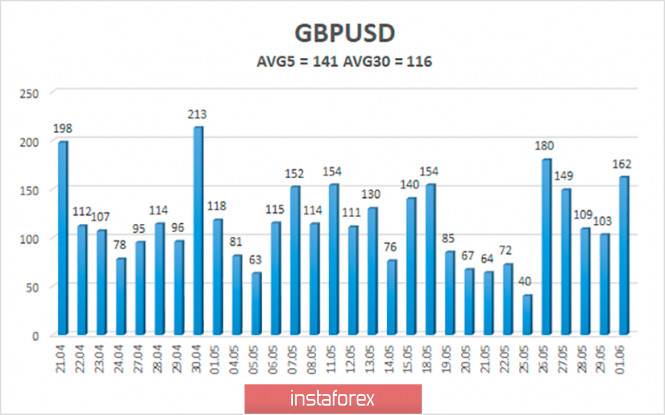4-hour timeframe

Technical details:
Higher linear regression channel: direction - sideways.
Lower linear regression channel: direction - downward.
Moving average (20; smoothed) - upward.
CCI: 230.3879
The British pound unexpectedly rushed up on the first trading day of the week. It is also unexpected how the European currency rose in price over the past week. At the same time, the reasons for such a strong growth of the British currency are again quite difficult to find. They can be "invented", you can find some kind of coincidence, but now everything is not as obvious as it was in quiet times. In our article on the euro/dollar, we explained why the fact that mass protests and rallies against the police and government in the United States is not the reason for the strengthening of the euro currency. Now the same applies to the pound, which can not show growth at all if we are talking about a fundamentally sound growth.
If what is happening in the United States can now be called a social crisis, chaos, political confusion, and this applies to everything that is happening, and not just the protests related to the murder of a black guy, then in the UK, the regime of ethereal silence continues. Recently, Boris Johnson aired only a few times, who did not say anything important or interesting. The markets, however, Johnson's entourage still learned that in the second half of June, the Prime Minister intends to negotiate a comprehensive agreement with EU leaders personally. However, according to many experts, this step will not lead to any positive results. The UK has also abandoned strict quarantine measures, and health officials are already sounding the alarm. In their opinion, the contagion index (an index showing how many people each carrier of the virus infects; if it is higher than 1, it is considered that the rate of virus spread is increasing) has just fallen below 1, so any relaxation of quarantine measures can lead to a new wave of epidemics. Scientists also report that in recent days in the UK again recorded a large number of cases of infection, about 8,000 per day. John Edmunds, a professor at the London School of Hygiene and Tropical Medicine, believes that the UK government needs to think about how to contain the epidemic, not about its political ratings.
At the same time, a new international conflict is brewing, this time between China and the UK. And also because of Hong Kong. The UK, which has signed an agreement with Beijing under which Hong Kong has a special autonomous status until 2047, is going to simplify the procedure for granting Hong Kong citizens British citizenship. According to the same agreement with Beijing, Hong Kong residents do not have the right to permanent residence in the UK. However, as Beijing and Hong Kong authorities are going to make some laws that strengthen control over the autonomous region by the Chinese authorities and its autonomy may be purely formal, the US, UK, and other countries dissatisfied with what is happening. China itself is also dissatisfied, threatening to respond with countermeasures to all states that will take measures because of the adoption of the law "on national security in Hong Kong". According to Beijing, China has the right to adopt this law and does not violate any international agreements and rights. Hong Kong is a part of China, although it is autonomous. Chinese Foreign Ministry spokesman Zhao Lijian said last week: "If the UK continues to change its current policy, it will violate not only its own position and obligations but also the basic norms of international law. We oppose this and reserve the right to take retaliatory measures. China hopes that the UK will objectively and fairly consider the national security bill in Hong Kong, as well as respect China's position and concerns, and will not interfere in Hong Kong's affairs." Earlier, British Foreign Minister Dominic Raab said that London is ready to provide Hong Kong residents with British passports with the opportunity to live and work in the Kingdom without any restrictions. He also stressed that London will take such a step if Beijing passes the law "on national security", which violates the previous agreement on the special status of Hong Kong.
It is also worth noting that the Brexit negotiations remain at an impasse. Michel Barnier, the chief negotiator for the European Union, accuses London of disrupting the timing of the negotiation process and says that Brussels will not agree to a deal if the UK does not meet the conditions and obligations that were previously agreed. Michel Barnier recalls that about 50% of British exports go to the EU, while the EU exports to Foggy Albion only 7% of the goods produced. This statement was made on the eve of the fourth round of negotiations, which begins today. Naturally, London also blames the opposite side, i.e. Brussels, for the breakdown of the negotiations. Although in general, it does seem that London is not in a hurry to reach agreements, it is not in a hurry to concede and not in a hurry at all. It is difficult to say what Boris Johnson is counting on. A huge number of international economists and experts say in one voice that if London and Brussels part without a "deal", in the first place, it will be a blow to the British economy. And this opinion existed even before the crisis caused by the "coronavirus", which hit the UK the most in Europe. Thus, London risks being left without a free market with the European Union in 2021, and Boris Johnson's political ratings, according to some studies, have begun to decline. If in December last year Johnson won his most striking victory (before that there were only defeats), now we can assume that this victory will remain the only one, because Johnson is more proud of the post of head of state. The fight against the epidemic has failed, there is no trade agreement with the European Union, and there is no agreement with America. Johnson strictly stands by his position of "hard" Brexit, and pay for all the government's decisions will be ordinary Britons, who in 2021 may strongly regret that it was Boris Johnson who won last year. Recent research suggests that the Labor Party is recovering its political ratings after a failure in the parliamentary elections and is already on the heels of Boris Johnson and his party. The activities of their leader, Keir Starmer, are approved by 40% of the population and 17% do not approve. Boris Johnson has a higher number of satisfied voters - 57%, but the number of dissatisfied is much higher - 35%. Other polls also confirm that the overall support rating for the Labor leader is now higher.
And the last factor in the fall of the British currency is the possible negative rates of the Bank of England. We believe that this is an almost inevitable step for the British regulator since the economy simply cannot withstand so many shocks. And if 2020 is still somehow managed to bring to an end, then in 2021, without a trade agreement with the European Union, the British economy will require new large-scale incentives.

The average volatility of the GBP/USD pair has increased over the past 5 days and is now 141 points. On Tuesday, June 2, thus, we expect movement inside the channel, limited by the levels of 1.2338 and 1.2620. A downward turn of the Heiken Ashi indicator will indicate a downward correction. Fixing the price below the moving average will change the downward trend.
Nearest support levels:
S1 – 1.2451
S2 – 1.2390
S3 – 1.2329
Nearest resistance levels:
R1 –1.2512
R2 – 1.2573
R3 – 1.2634
Trading recommendations:
The GBP/USD pair on the 4-hour timeframe continues the upward movement that has strengthened today. Thus, today it is recommended to continue trading the pound/dollar pair for an increase with the goals of 1.2512 and 1.2573 and keep the longs open until the Heiken Ashi indicator turns down. It is recommended to sell the pound/dollar pair when the bears manage to return to the area below the moving average, with the first targets of 1.2268 and 1.2207.
The material has been provided by InstaForex Company - www.instaforex.com